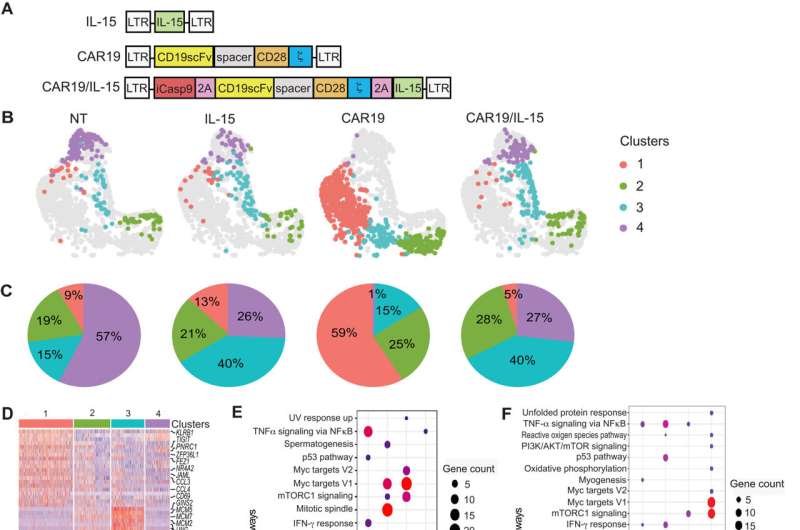This article has been reviewed according to Science X's editorial process and policies. Editors have highlighted the following attributes while ensuring the content's credibility:
fact-checked
peer-reviewed publication
trusted source
proofread
Lost metabolic fitness of CAR NK cells is key mechanism of tumor resistance, study discovers

A new study led by researchers at The University of Texas MD Anderson Cancer Center has discovered that loss of metabolic fitness in chimeric antigen receptor (CAR) natural killer (NK) cells is a critical mechanism of resistance, with infused cells gradually losing the ability to compete with tumor cells for nutrients, leading to tumor relapse.
The study, published today in Science Advances, demonstrates that engineering CAR NK cells to express interleukin-15 (IL-15) enhances the cells' metabolic fitness and provides a longer-lasting anti-tumor response. In addition, two infusions of CAR NK cells expressing IL-15 boosted survival in comparison to a single dose.
The collaborative research was led by co-corresponding authors Ken Chen, Ph.D., professor of Bioinformatics and Computational Biology, and Katy Rezvani, M.D., Ph.D., professor of Stem Cell Transplantation & Cellular Therapy, along with researchers in the Chen and Rezvani labs.
"Understanding the mechanism of resistance facilitates more focused interrogation to identify strategies by which we can mitigate or circumvent these resistance mechanisms and improve efficacy of the CAR NK cell therapy," Chen said.
As part of the preclinical study, researchers focused on genetically engineered NK cells with a CAR targeting the CD19 tumor antigen (CAR19). Using laboratory models of lymphoma, they evaluated cells that expressed either CAR19 alone, IL-15 alone, or both CAR19 and IL-15 to investigate the ability of IL-15 to activate NK cells and to enhance their potency and persistence.
Researchers observed the emergence of NK cell clusters with distinct patterns of activation, function and metabolic signature associated with different phases of in vivo evolution and tumor control. Interactions with the highly metabolically active tumor resulted in loss of metabolic fitness in NK cells that was partly overcome with the expression of IL-15.
To overcome this resistance, mice received a second infusion of CAR19/IL-15 NK cells 14 days after the first. The second infusion increased the number of functional NK cells and resulted in long-term tumor eradication.
The relevance of the preclinical findings were confirmed in samples from two patients with lymphoid malignancies treated with CAR19/IL-15 NK cells as part of a recent clinical trial.
"Our data suggest that successful treatment using CAR NK cells may require multiple infusions in order to achieve a robust NK cell population capable of mounting a strong anti-tumor response, especially for difficult to treat and highly metabolically active tumors," Rezvani said.
The increase in functional NK cells with a second infusion provides researchers with a clinically actionable strategy to improve efficacy of CAR NK cell therapy and warrants further investigation. Researchers will continue to validate their findings in additional tumor models and study mechanisms of resistance in upcoming clinical trials with CAR NK cells targeting CD70 in solid tumors.
More information: Li Li et al, Loss of metabolic fitness drives tumor resistance after CAR-NK cell therapy and can be overcome by cytokine engineering, Science Advances (2023). DOI: 10.1126/sciadv.add6997




















